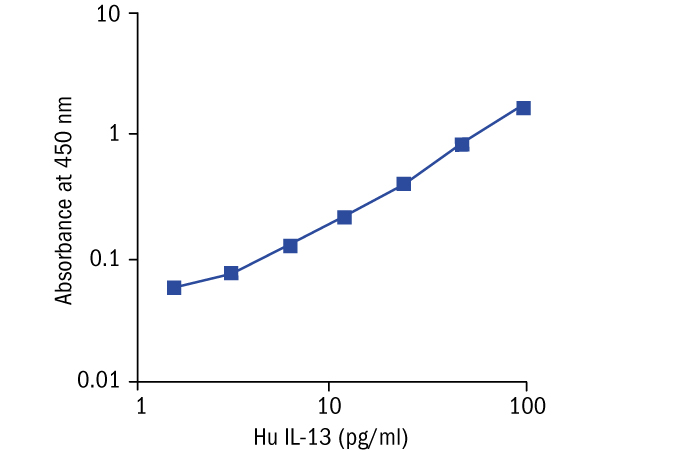Type
Sandwich ELISA, Biotin-labelled antibody
Applications
Serum, Plasma-EDTA, Plasma-Heparin, Plasma-Citrate, Amniotic fluid, Cell culture supernatant
Sample Requirements
50 µl/well
Shipping
At ambient temperature. Upon receipt, store the product at the temperature recommended below.
Storage/Expiration
Store the complete kit at 2–8°C. Under these conditions, the kit is stable until the expiration date (see label on the box).
Calibration Curve
Calibration Range
1.6–100 pg/ml
Limit of Detection
0.73 pg/ml
Inter-assay (Run-to-Run)
CV = 6.0%
Spiking Recovery
CV = 4.6%
Research topic
Cytokines and chemokines and related molecules
Summary
Interleukin-13 (IL-13) was first described as a protein product, designated P600, encoded by an RNA produced by activated mouse Th2 cells. More recently, the cDNA cloning of the Human homologue of P600, Human IL-13, has been reported. Human IL-13 is a nonglycosylated protein of 132 amino acids with a molecular weight of 12 kDa. The IL-13 gene is located on chromosome 5q23-31, in the same region as the genes encoding IL-3, IL-4, IL-5 and GM-CSF. It is produced by activated CD4+ and CD8+ T cells, but the expression seems to be more abundant in CD4+ T cells. Although it is a Th2 cytokine in the mouse, it appears to be produced by Th0, Th1, and Th2-like Human T cell clones.
IL-13 is a pleiotropic cytokine whose spectrum of action encompasses B cells, mononuclear phagocytes, and large granular lymphocytes. IL-13 induces CD23 expression on B cells, promotes B cell proliferation in combination with anti-Ig or CD40 antibodies, and stimulates secretion IgE, and IgG4. IL-13 has also been shown to prolong survival of Human monocytes and increases surface expression of MHC class II, CD23, and members of the integrin superfamily, like CD11b, CD11c, CD18, CD29 and CD49e. IL-13 inhibits the production of a series of cytokines like IL-1, IL-6, TNFa na IL-8 by activated Human monocytes. The capacity of IL-13 to induce IgE synthesis indicates that IL-13 may play an important regulatory role in IgE-mediated atopic diseases. The measurement of IL-13 in body fluids may thus provide further information about the pathophysiology of atopic diseases.
Furthermore, IL-13 inhibits HIV-1 replication in primary culture-derived macrophages and represents a candidate cytokine for the suppression of HIV infection within monocytes and macrophages in vivo.
Find documents for the lot
Example Instructions for Use (RUO)
Example Instructions for Use (RUO)
Safety Information (RUO)
MSDS (RUO)

